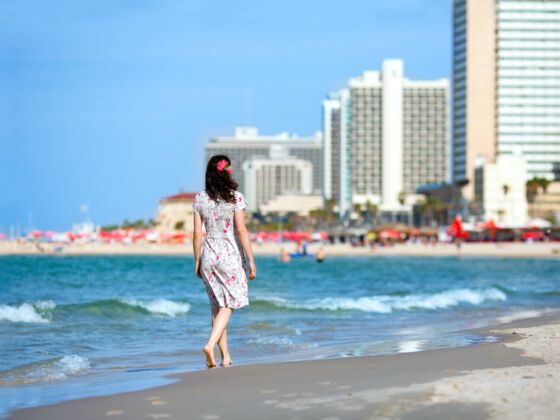Bezalel Eliyahu, leaning heavily on his cane, greets me in front of his jackfruit tree at Moshav Kidron in south central Israel. At 83, he is carrying more than his own weight. He is carrying the shell of something that belongs to another Israel. Something I recall from the stories I grew up with as a child. Stories of radical reinvention, of fractured Jewish lives migrating from west to east to rendezvous with their new selves under a disputed sky.


Eliyahu, once a radio technician in Chendamangalam in Kerala, immigrated to Israel in 1954. He mastered the art of horticultural technology, learned the hidden language of flowers. “I came with an empty mind, so everything I learned about flower growing was new to me. If I had my own ideas, I never would have learned anything.”
His hawk face, shining with welcome, transports me through a flimsy curtain, where ordinarily a land mass would be. I am back again in India. Some people, more than others, seem to embody entire countries.
There is a picture on his living room wall he wants to show me. He is shooting me a conspiratorial look, as if we were in on the event together. With his arm around my shoulder even his house seems familiar.
The picture, taken in 1994, is of him and Prime Minister Rabin shaking hands on the occasion of his winning the prestigious Kaplan Prize for his horticultural achievements in the South of Israel. I notice that the prime minister, with his displeased school principal look, was trying unsuccessfully to intimidate Eliyahu.
“He wanted to know why I wasn’t wearing a tie. I told him, ‘Mister Prime Minister I am a farmer. Farmers don’t wear ties.’”
He left India because he wanted to lead a Jewish life in Israel. (“Every year at the Passover seder we would sing ‘Next year in Jerusalem.’ All Cochini Jews took that seriously.”) I left America and traveled to India because I wanted to shake free of my Jewish cultural life in New York. Each of us with the need to try on new skin. But Eliyahu has been able to wear both of his.
“I traveled around India teaching for free the basics of the greenhouse technology that were so successful for us in Israel. In 1985, I was invited to speak of this technology in the Indian parliament. Years later, Prime Minister Deve Gowda came to visit my greenhouse at Moshav Shachar.”
He tells me all this over tea and super sweet Indian pastries. He is like a man with two wives. He clearly loves both of them. Both have honored him lavishly. (In 2006, India gave him the Pravasi Bharatiya Samman achievement award, its top honor for overseas Indians.) When he speaks of India, his voice trips over itself with joy. Being old myself, I imagine that has to do in part with roots, with the way we reconnect in old age to first things.
The texture of his affection for Israel is different: a marveling at the windfall of a new land, a new language, a new life granted him as an adult. But also a worried love for his country in perpetual conflict with its neighbors, and in his case, with most Israelis who do not share his longstanding opposition to settlements, occupation, checkpoints, anything that prevents peace with the Palestinians.
Being with Eliyahu, I feel deprived: I cannot love even one country, much less two.